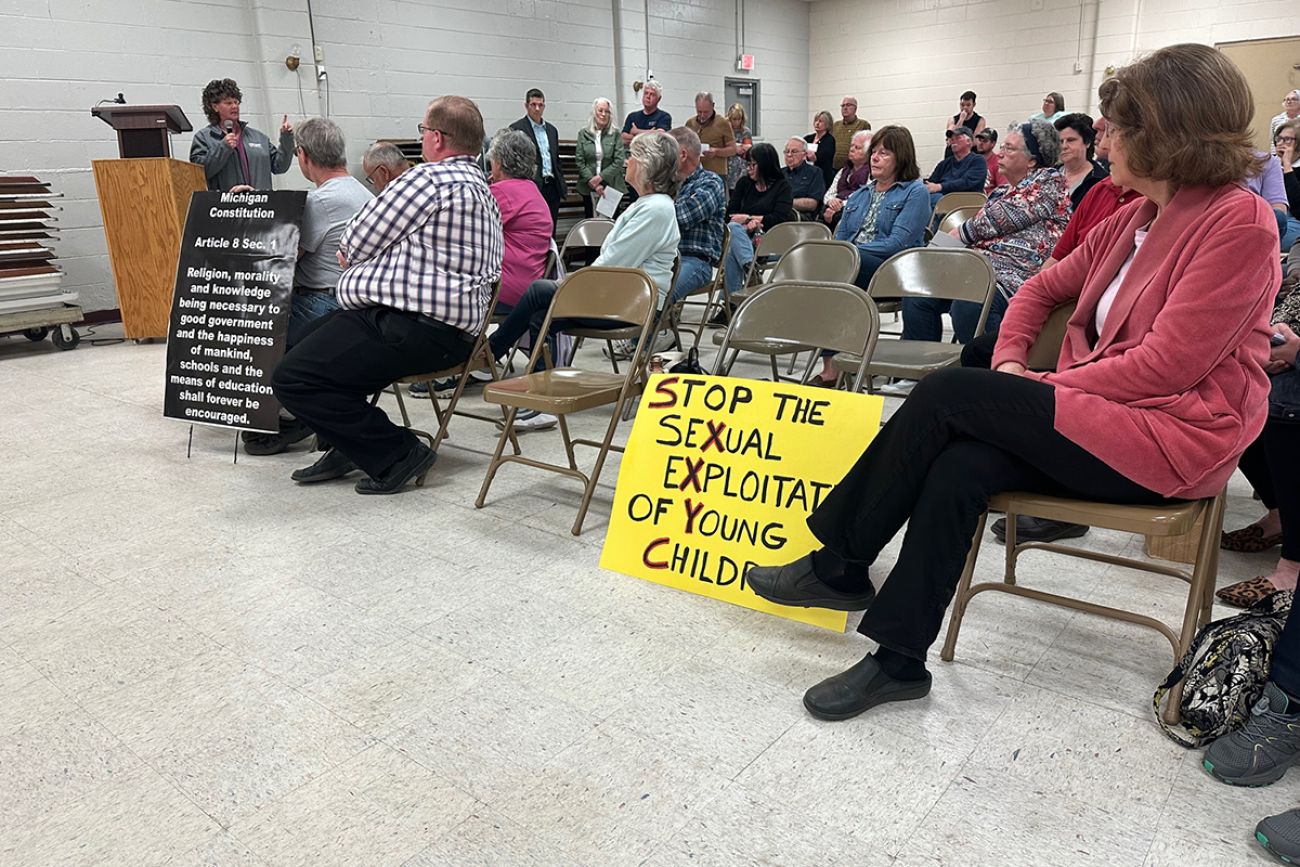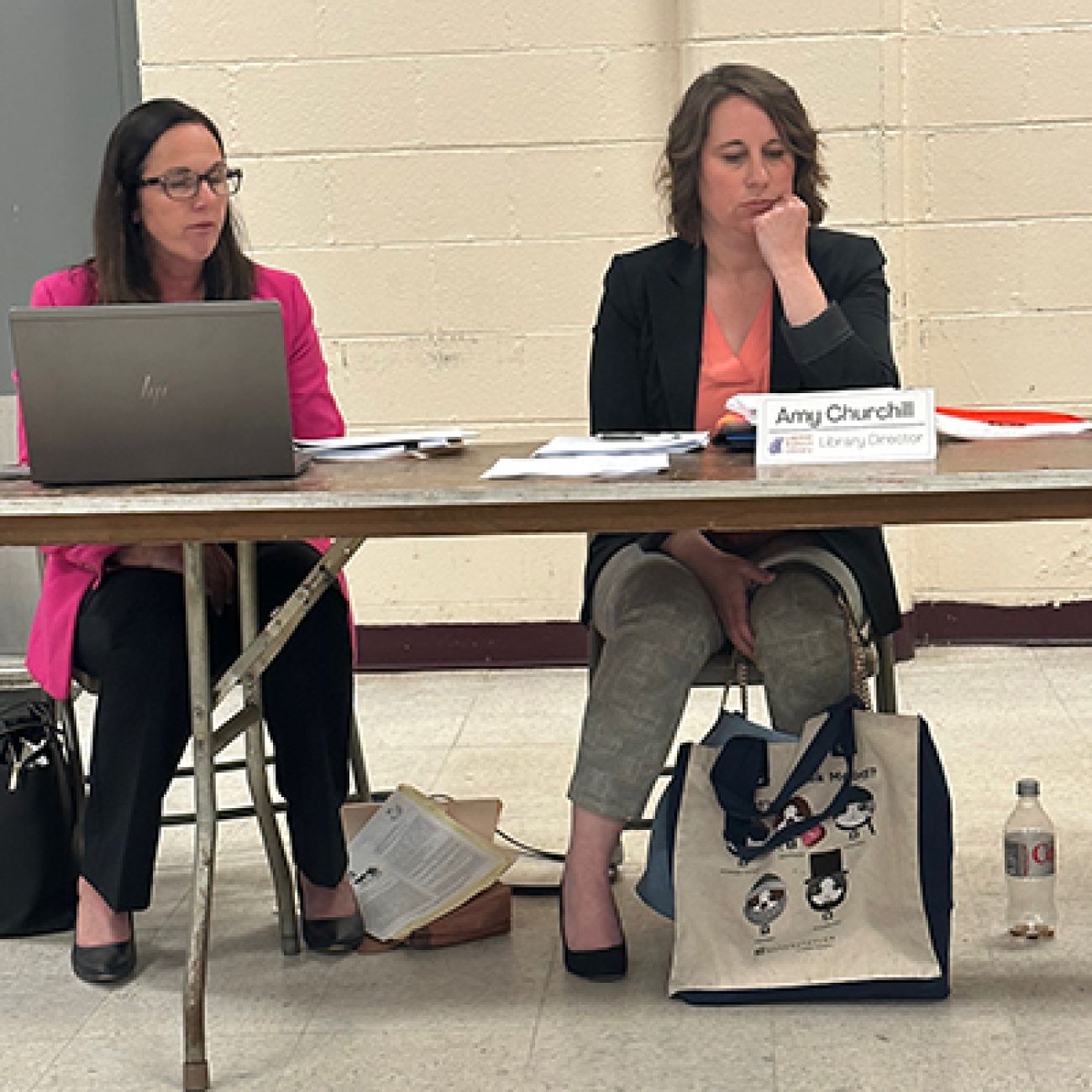Lapeer library keeps LGBTQ-themed books, but more battles loom

- A Michigan prosecutor in Lapeer County mulled criminal charges against librarians over an LGBTQ-themed book
- On Thursday, however, the local public library voted to keep “Gender Queer” on its shelves
- The battle is one of many happening over books in libraries across the state
LAPEER —A Michigan public library that faced threats of criminal prosecution over an LGBTQ-themed book will keep the book on its shelves.
The Lapeer District Library Board voted unanimously Thursday to deny a request from a patron to remove “Gender Queer” from its collection. The board also voted unanimously to keep a second challenged book, the children’s book “Fred Gets Dressed,” on its shelves.
The decision, made in front of a crowd of nearly 100 residents, may not be the last battle in book wars in this conservative community. Some residents at the meeting warned they would oppose future millages that provide tax revenue to operate the library if “Gender Queer” stays on the shelves. Others referenced a book about racial issues they felt should be removed.
Related:
- Michigan prosecutor mulls charging Lapeer library over LGBTQ book
- Book bans move from sex to war, as west Michigan school removes ‘Jarhead’
- Michigan GOP official: Shut down ‘by force’ public library with LGBTQ books
And two members of the board who voted to keep the controversial books could be replaced in January by conservative-leaning Lapeer County Commissioners.
As Bridge Michigan first reported in March, Lapeer County Prosecutor John Miller was mulling criminal charges against library officials if “Gender Queer” remained on the shelves. Miller cited the specific criminal code — 750.145a — he believed the book’s presence in a public library could violate.
That law is often associated with police sting operations of adults who prey on minors, barring enticing anyone under 16 "to commit an immoral act, to submit to an act of sexual intercourse or an act of gross indecency or to any other act of depravity or delinquency.”
After Bridge’s article appeared, Miller backpedaled on the criminal threat, but said “books that encourage children to engage in sexual acts when they are not the legal age are not appropriate for a public library.”
The threat of criminal charges against librarians was believed to be a first in the state. Since then, a county commissioner in Cass County proposed an ordinance that sought to criminalize the distribution of sexually "explicit" library books to children. That proposed ordinance was withdrawn.
“Gender Queer” tells the story of how the author came to terms as a teen with their sexual identity, the difficulties of coming out as nonbinary to family and friends and navigating issues of sexuality. The graphic novel includes illustrations of sex acts, and has sparked some controversy in libraries in Michigan and across the country,
The Lapeer District Library purchased the book last fall at the request of a patron. Shortly after, community members began objecting to it. One resident checked out the book and brought it to the police, who then returned it back to the library.

At Thursday’s meeting, most residents who were critical of “Gender Queer” said they weren’t opposed to LGBTQ themes, but didn’t want sex-related illustrations in a library where children might come across it, even though it is shelved in the adult section.
A second book that a patron requested be removed from the library doesn’t have sex-related illustrations. That book, “Fred Gets Dressed,” is a children’s book about a young boy playing dress-up with his parents’ clothes, including putting on his mother’s clothes, jewelry and makeup.
County resident John DeAngelis was one of dozens of people who spoke Thursday before the board vote. “I’m asking the board, are you willing to protect children?” DeAngelis said. If the board voted to keep the book, “I don’t think you’ll ever get another millage passed, and that’s a shame.”
On the west side of the state, in Ottawa County, voters defunded the Patmos Public Library in 2022 in a fight over several LGBTQ-themed books, including “Gender Queer.”
Patmos officials moved “Gender Queer behind the desk, but it is still available to be checked out.
For now, that library remains open through donations it has received.
In Lapeer, voters approved an operating millage for the library in 2022, before that community’s book controversy arose. The library millage won’t be on the ballot again until 2027.
Many residents told the board Thursday they considered “Gender Queer” to be “child pornography,” and they no longer feel safe allowing their children to go to the library.
Cheryl Matas spoke in favor of keeping both challenged books. “Book bans are never remembered fondly by history,” she said. “A book will not turn a child gay.”
Anne Seurynck, a Michigan attorney who represents the Lapeer District Library and its board, said at the meeting that under U.S. and state law, the challenged books are not pornography, and that removing the books could leave the library open to lawsuits.
“The First Amendment protects citizens against government censorship,” Seurynck said. “Any request to censor and remove material by one or more patrons impacts other patrons' right to receive that same information in a public library. Protected rights cannot be taken away from some patrons, because other patrons disagree with the content.
“If the library were to remove the books based on one segment of a population’s views…removing books would never end,” Seurynck said.
But book challenges continue to pop up across the state, including a recent decision by Hudsonville Public Schools to remove “Jarhead,” an acclaimed memoir of a Marine’s experience in the Gulf War.
School libraries have more discretion to restrict books than public libraries because schools operate under the legal concept of “in loco parentis,” meaning they are acting in the place of a parent, Seurynck said. Public libraries do not assume that parental role and so “the responsibility for the choices of the books that the kids have solely rests with the parents or legal guardians.”
After the meeting, some residents upset about the challenged books shared photos of sex-act illustrations in “Gender Queer” and lists of frequently banned books that one opponent said would “curl your hair.” People who supported the library’s decision called the actions of opponents akin to “Nazis.”
Larry Smith told Bridge he wished both sides would try to compromise. One possibility: keeping “Gender Queer” but putting it in an area where children would only see it if parents gave permission.
“I’m not for restricting (books) at all,” Smith said. “But there are 350 million of us (in the United States). The reasonable 80 percent in the middle can find common ground, but the 10 percent on either side are the loudest and angriest.”
Michigan Education Watch
Michigan Education Watch is made possible by generous financial support from:
Subscribe to Michigan Health Watch
See what new members are saying about why they donated to Bridge Michigan:
- “In order for this information to be accurate and unbiased it must be underwritten by its readers, not by special interests.” - Larry S.
- “Not many other media sources report on the topics Bridge does.” - Susan B.
- “Your journalism is outstanding and rare these days.” - Mark S.
If you want to ensure the future of nonpartisan, nonprofit Michigan journalism, please become a member today. You, too, will be asked why you donated and maybe we'll feature your quote next time!





